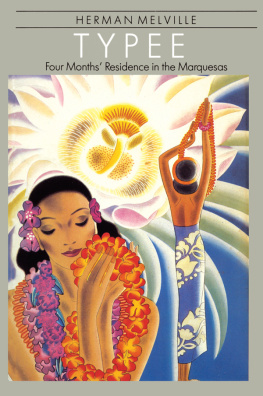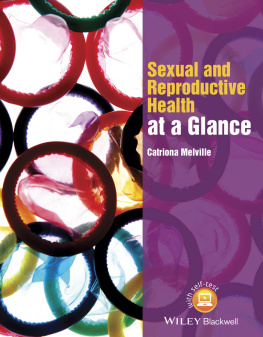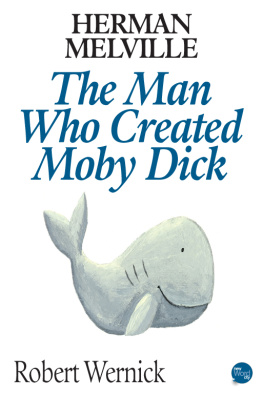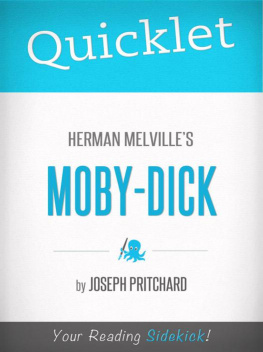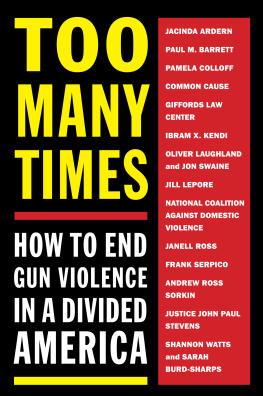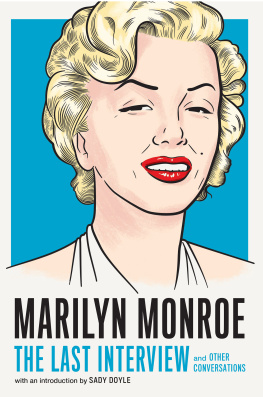First published in 1846 by Kegan Paul International Ltd
This edition published in 2013
by Routledge
2 Park Square, Milton Park, Abingdon, Oxon OX14 4RN
Simultaneously published in the USA and Canada by Rautledge
by Routledge
711 Third Avenue, New York, NY 10017
Routledge is an imprint of the Taylor & Francis Group, an informa business
this edition KPI Limited 1985
No part of this book may be reproduced in any form without permission from the publisher, except for the quotation of brief passages in criticism
ISBN 0-7103-0132-4
To this Edition
E ARLY IN 1846, the publication of a remarkable book called Typee , by Herman Melville, signalled the literary discovery of Polynesia. It was an account of a young sailor who deserts his whaling ship and flees to an isolated valley on an enchanting island where he lives among cannibals, tarries with a beautiful maiden, sees strange and wonderful things and, after many adventures, escapes to tell his story. It established the tradition of romantic writing that was to become part of the unique literary heritage of the Pacific, but Typee was far more than a well-told tale of dusky maidens and cannibal kings on a fanciful island in uncharted seas. It was set firmly in the Marquesas Islands in the year 1842, and was an extraordinary mixture of fact and fiction, reality and romance. The beautiful heroine Fayaway and the faithful native Kory-Kory were children of Melvilles imagination, but their island home and ways owed nothing to invention, for Melville had lived among the natives of Nukuhiva and had sojourned in Tahiti and Hawaii. Typee was the first account of life in the Pacific by one who had lived as an islander, and could speak of traditional island customs with intimacy. And it unleashed a storm of controversy that hit the reading public of England and America with all the force of a tropical hurricane.
Before Typee , the Pacific had been on the very periphery of the consciousness of the civilized world; a remote region that was ;
What though the spicy breezes
Blow soft oer Ceylons isle,
Though every prospect pleases
And only man is vile,
In vain with lavish kindness
The gifts of God are strown,
The heathen in his blindness
Bows down to wood and stone.
Can we, whose souls are lighted
With wisdom from on high,
Can we to men benighted
The lamp of life deny?
Salvation! oh salvation!
The joyful sound proclaim,
Till each remotest nation
Has learnd Messiahs name.
With the publication of Typee , the public was presented with a radically different point of view one that was less a peep at Polynesian life than a shocking eye-opener. It contained scenes that many found positively immoral. Here was a society where no woman had fewer than two husbands, where bevies of naked girls swam out to greet visiting ships, where nights were enlivened by the performance of voluptuous dances in which every part of the body conveyed unmistakably intimate messages scandalous indeed to those conservative elements of the audience who were, as Lewis Mumford has remarked, pathologically sensitive to the mere mention of a female ankle. But Melvilles offense to morality went far beyond this. Not only was Typee the first book to give an intimate account of island life it spoke of heathen ways with affection and admiration, and it dared to assert that the customs of the savage were, in instances, superior to those of civilized man. More shocking still, it contained fierce denunciations of missionary activities in Polynesia. And finally, it deplored the deleterious effect that contact with the white man was having on the natives of the Pacific and condemned the political activities of the Great Powers who were at that very moment carving Polynesia into a series of colonial possessions.
Not surprisingly, Typee met with a thunderous reception, howls of outrage and cries of acclaim being fairly evenly mixed. In England, John Bull found it bewitching, and the New York Evangelist was unflinching in its condemnation:
The work was made, not for America, but for a circle, and that not the highest, in London, where theatres, opera-dancers, and voluptuous prints have made such unblushing walks along the edge of modesty as are here delineated to be rather more admired than we hope they are yet among us.
It almost seems that two different books are under discussion and certainly Typee posed special problems for the reviewers, not only because of its sensational contents, but also because its sometimes perplexing mixture of reality and imagination made it a difficult book to categorize. Was it a true narrative or a romance: was it fantasy or fact?
The manuscript of Typee had first been offered to the American publishers Harper & Brothers as an autobiographical narrative, but they had rejected it on the grounds that it was impossible that it could be true and therefore was without real value whom he acknowledged in the new material. They also made repeated requests for documentary proof, such as letters written home, that would establish that Melville had actually visited the Pacific. Wiley & Putnam took an entirely different tack. The American public was more conservative than the English, and Melvilles most devastating criticisms of Christian evangelists had been reserved for Americans at work in Hawaii. Wiley & Putnam worried that Typee was all too true, and sought for some way to lessen its authenticity.
In the debate that followed publication, positions were taken up along national lines. The English, on the whole, wished to believe that Typee was true and treated it as a substantially factual account while relishing its imaginative flourishes. In America, large sectors of the public were positively disinclined to believe that there was any truth at all in Typee. Hostile critics treated it as a blasphemous fiction, and even those who admired the book were inclined to take it as a romance. So great was the outcry that followed the appearance of the first edition in America that Wiley & Putnam embarked on a policy of outright censorship and persuaded Melville to revise the text of Typee for subsequent American editions. Melville soon regretted this compromise and in later life would refuse all requests to moderate his sentiments or his writing style, to the detriment of his career. Now, however, he was a young man trying to earn a living from his writing, anxious to do anything that might increase the sales of his work.
In attempting to explain the changes to his English publisher, Melville wrote:
The revision will only extend to the exclusion of those parts not naturally connected with the narrative I am persuaded that the interest of the book almost wholly consists in the intrinsic merit of the narrative alone and that other portions, however interesting they may be in themselves, only serve to impede the story. The book is certainly calculated for popular reading, or for none at all. If the first, why then, all passages which are calculated to offend the tastes, or offer violence to the feelings of any large class of readers are certainly objectionable.
Proceeding on this principle then, I have rejected every thing, in revising the book, which refers to the missionaries. Such passages are altogether foreign to the adventure, and altho they may possess a temporary interest now , to some, yet so far as the wide and permanent popularity of the work is concerned, their exclusion will certainly be beneficial, for to that end, the less the book has to carry along with it the better.

